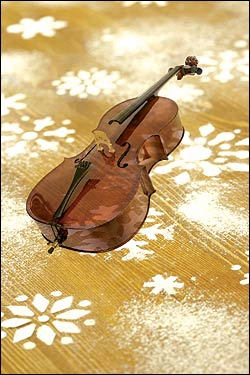Midlife crises come in different flavors. Men proverbially crave a little red sports car. Some crave new romance, even a new wife. Women’s midlife crises seem to center around family: The empty nest breeds longing for change. I suspect that all forms of the condition reflect one thing: a deep feeling that you took a wrong turn early in life, and a sense that somehow you can start over.
I know exactly where my life went wrong. It was the day I let someone put a trombone in my hands and didn’t insist on a cello instead. I realized this far too late to do anything about it. Or so I thought until recently, when what-might-have-been got to be too much for me. That was about a month and a half ago, and although both my hands now ache much of the time and my cats have more or less moved out the house, I am assured that you can go home again, at least if you want to badly enough.
So can you; you don’t need talent, natural dexterity, or much money. What you do need is spare time, determination, and a lot of patience. And a teacher. Do not believe the little books that claim to provide the elements of musicianship; do not even look at the CDs and DVDs. You need a teacher, even if your ambitions extend no further than to accompany yourself on the ukulele. Teachers cost money, but they also keep you honest, keep you at it, and make sure you don’t hurt yourself. (The state doesn’t license music teachers as it does other teachers or massage therapists or chiropractors, but an incompetent music teacher can cripple you.) If you don’t happen to know a professional musician who plays the instrument of your dreams, your best first step is to visit one of the many stores that rent musical instruments. Almost certainly you’ll find flyers and business cards from many hopeful teachers, and they’re likely to be competent because the shop owners would be crazy to allow bad ones wall space.
If you are of mature years, your biggest problem will be finding a teacher who’ll take you seriously. That initial resistance is a good thing; the better and more successful a teacher, the less likely the teacher is to need or want to take on vanity students. Most, however, will give an insistent prospective student a hearing. Mine, when he finally granted me an audience, brushed aside my question about his fee, listened mutely while I tried to explain my belated attraction to the instrument he had spent 50 years mastering, and then said: “If you really want to do this, you must understand that if you spend a solid hour a day practicing, it will be two years before you can really play anything; and by that time, your ambitions will have expanded so much that you may feel worse off than you do now. Do you really feel you want to do this?” I said yes, and again raised the subject of his fee. “Don’t worry,” he said. “You’ll pay.”
And so I have, in the aforesaid hand cramps and intrusions into my leisure time. But taking lessons as an adult is very different from doing so as a child. I barely play when I show up for lessons. I listen, I watch, I imitate. Above all, I learn tricks of a thousand-year-old trade from someone who learned from a great master of the instrument, who in turn learned from another. Adult-to-adult communication is so much more efficient and companionable than that between the most patient adult and the most eager young student that one makes progress remarkably quickly—always assuming the personal motivation is there.
I admit that sometimes—particularly when, trying to follow my guru’s instructions, I find myself making noises like a soul in torment—I wonder if the end justifies the means. But I have found ways of setting goals for myself that don’t seem impossible to fulfill. Suppose I’m never skilful enough to hold up my end of a Haydn string quartet; there are still the much simpler cello parts of dozens of Haydn piano trios. I may never dare play one of the Bach suites for solo cello in public, but the simple continuo (bass line) accompaniment for a baroque trio sonata surely won’t forever be beyond me. Even as my bow slips sideways into a keening yowl, even while my index finger once again fails to find the first position on the first or second or even third try, I am content. It feels right. My life in music is back on track.
Most stores that sell musical instruments also rent them, at surprisingly modest rates. My cello, from Bischofberger Violins Ltd. (1314 E. John St., 206-324-3119), rents for $120 for three months, with rental cost applicable to purchase; insurance is another $10. Capitol Music (718 Virginia St., 206-622-0171) rents a full spectrum of string and wind instruments, and is the premier resource in the Northwest for instructional materials and sheet music.








